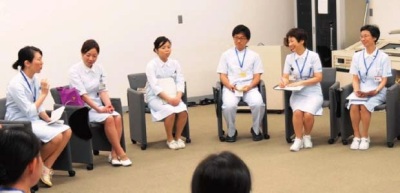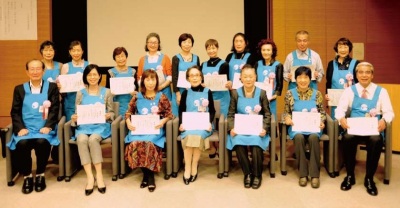Top > About Us > News Letter > TOPICS
TOPICS
On-the-job nursing training was provided to deepen multidisciplinary collaborative relationships
In addition to physicians, there are employees with expertise, such as nurses, pharmacists, and clinical engineering technologists, as well as clerks working in a hospital. To provide the best health care service in collaboration among all employees, it is important to know each other’s job. The Nursing Department provided on-the-job nursing training for other employees this year again. One of the purposes was to learn “how to communicate with patients”. The participants wore a uniform and worked with the nurse in charge. There were a lot of opportunities to learn, for example, talking to a patient and discovering their condition from casual conversation and subtle expressions, and learning how to share information among different professions. A pharmacist who participated said, “I realized what is going on and why it is urgent when I get an urgent request for unscheduled dispensing.” A clerk participant commented, “I usually work at the desk, but my attitude toward my work has changed, once I knew what is going on at the clinical site”. Understanding each other’s situation should result in respecting each other, making smooth communication, and preventing misunderstandings and errors. We would like to continue this type of approach in the future.

20th anniversary of the University of Tokyo Hospital Niko-Niko Volunteers
Do you know that the University of Tokyo Hospital has ~200 “Niko-Niko Volunteers”? (Niko-Niko means “smile”) Their uniform is a light-blue apron. These volunteers have their 20th anniversary this year, because their activities were introduced as a part of patient service in July 1994, when the current outpatient clinic was opened. The somewhat heartwarming name is derived from a concept, “Let’s communicate with patients with a smile all the time. We can give a big (niko-niko) smile, although we do not have special skills”. Activities of the Niko-Niko Volunteers are mainly assistance at the reception counter, to guide in the hospital, and assistance for wheelchair users. However, they also drop and pick up children who go to the hospital school during a long stay, play with children in the children's ward, and run the “Niko-Niko Bunko (library)” that is an inpatients’ recreation place. With the needs of patients, the activities of the volunteers have become wide-ranging. You may often be confused with procedures or get lost in a large institution, such as a university hospital; however, in the University of Tokyo Hospital, the Niko-Niko Volunteers provide you with great support.

Awardees of the 20th anniversary of the Niko-Niko Volunteers
